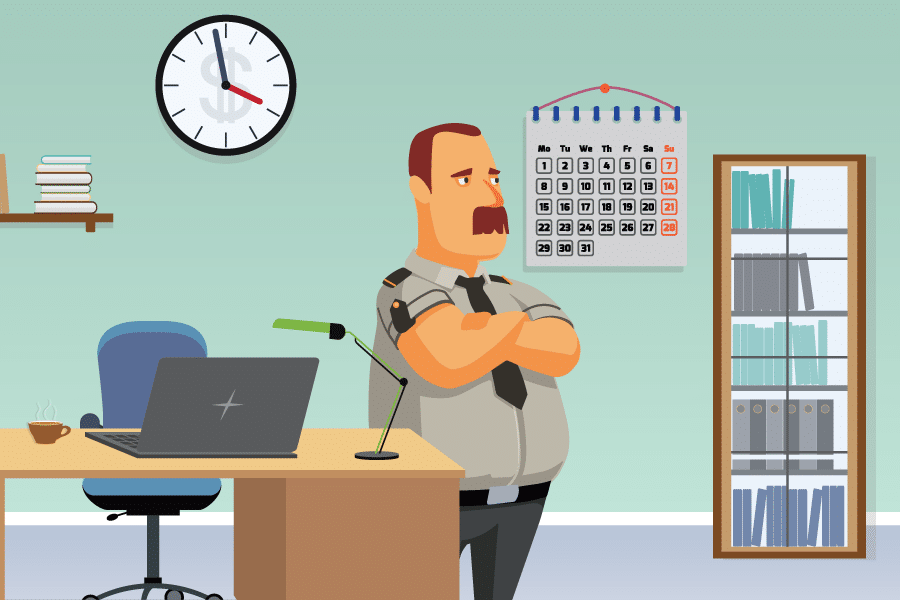A while back, we wrote about the fallacies of using “Hours per Week” (HPW) as a construct for defining and pricing security guard services. We argued that incentivizing security salespeople based on how many HPW they sell pits their best interests (making money!) against those of their customers (maximizing their facility’s safety and security). HPW discounts the role technology plays in empowering guards to do their jobs better – thereby diminishing their ability to best deliver in support of the customer’s objectives.
However, there’s an even more pressing reason for security guard companies to be pivoting away from an HPW model. It’s the changing labor market, which is making HPW an unsustainable way to run a business.
HPW assumes that there are sufficient personnel to fill the available and billable hours. There aren’t! In June, there were 10.1 million open jobs in the U.S. – the highest number ever recorded. The evidence is everywhere: help wanted signs posted in most storefronts, long lines at cash registers, horrendous waits for online support, and poor restaurant service due to lack of cooks and waitstaff. The labor shortage is also affecting the security industry. Companies seeking security guards are finding that guard companies are unable to fulfill their requests. As just one example, a guard company in Reno reports job applications down 95% from 2019[1], causing it to turn away customers. Even the army can’t hire guards! At Fort Stewart-Hunter Army Airfield, soldiers are performing security duties because there aren’t enough security-guard applicants.[2]
According to the U.S. Bureau of Labor Statistics, the mean hourly wage for a security guard in 2020 was $16.52. Meanwhile, many service jobs are now paying higher than that, along with a signing bonus, in order to attract workers. To entice candidates, guard companies must offer higher compensation. Most can’t afford to while keeping their prices competitive.
Even with higher wages, it’s unclear that a labor market that now offers so many options would have workers choosing guard jobs over more enjoyable and less dangerous positions. Security guards report some of the lowest job satisfaction of any industry, creating a transitory workforce that’s quick to jump ship as soon as something better comes along. According to industry expert and host of the SecurityGuyTV.com podcast, Chuck Harold, guard companies have turnover as high as 300% a year. “Just imagine, three times a year, all your guards are gone and new ones need to be trained. How do you deal with that? It’s an unwinnable situation for both the guard companies and their customers,” he says.
That’s why the HPW model must change. Immediately. The competition for workers is more intense than ever, and guard services cannot continue to rely on a dwindling number of low-wage workers who apply for guard jobs as a last resort.
A winning solution is Autonomous Remote Services (ARS), which allows guard companies to rebalance how they leverage machine and human resources. ARS utilizes technology to handle mundane, repetitive tasks like routine monitoring, ID verification, and health screening, and humans for the small percentage of situations that genuinely benefit from their judgment and expertise. Guard companies can purge their payroll of unskilled, transient workers and staff up with higher-caliber talent working interesting positions for better pay. The net cost to customers comes way down, as technology allows the overall smaller workforce to provide coverage of far more sites. HPW is no longer wasted on routine situations that can be handled equally well – or better – by technology. Best of all for guard companies, they can make more money! ARS reduces overhead, creates operational efficiencies, delivers superior results leading to increased customer satisfaction and retention, and opens new markets for security services due to the lower overall cost to end-users. Plus, ARS dramatically mitigates the impact of today’s labor shortage.
We’ve said it before: HPW is the worst metric. It measures something that doesn’t matter, is difficult if not impossible to deliver in today’s labor market, and it is holding the guard industry hostage to an outdated paradigm. It’s time to break free and begin fresh with new rules for best delivering security services.
HPW is dead. HPW is dead. Long live ARS.

